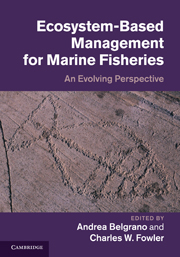PART II - ELEMENTS OF IMPORTANCE TO MANAGEMENT
Published online by Cambridge University Press: 17 February 2011
Summary
Chapters 5 through 9 introduce a variety of details important to management. It becomes clear that among the details are factors that, collectively, are impossible to account for completely in conventional approaches. This becomes obvious whether such factors involve the management of harvests taken from individual species, species groups, ecosystems, or complete ocean basins. These details involve the implementation of management, governance, and the involvement of stakeholders of various categories. The need to expand our perspective – the demand to expand the boundaries of our thinking – to include such detail is made obvious. Such progress involves accounting for the unintended consequences of our action (including a way to account for the unknowable, the unforeseeable, and the overall issue of risks – an infinite variety of risks). Evolutionary, behavioral, and social factors (including those of the human elements of ecosystems) count among the kinds of details that we must take into account. The details of population dynamics and related elements of life-history strategy cannot be ignored.
In this section, the dilemma faced in conventional thinking begins to become obvious. The infinite set of factors we begin to acknowledge with work exemplified by Chapters 5 through 9 cannot all be included in models such as those described in the first section. It is impossible to accomplish a full accounting of all forms of complexity through conventional processes – the infinite eludes us in approaches.
- Type
- Chapter
- Information
- Ecosystem Based Management for Marine FisheriesAn Evolving Perspective, pp. 181 - 182Publisher: Cambridge University PressPrint publication year: 2011



